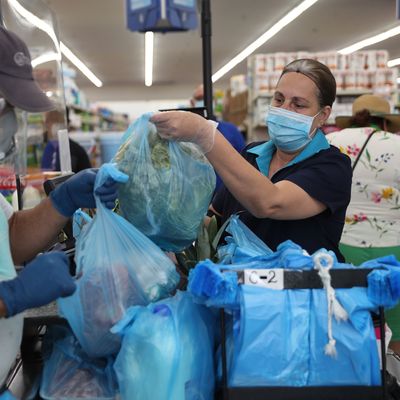
Ninety-nine percent of Michelle Lee’s customers are polite. But since the start of the pandemic, a small but consistent portion of the shoppers inside her Virginia Safeway store have become angry, even violent, amid the highly charged atmosphere. “Everything is final sale now, so a customer got upset because she couldn’t get a refund,” Lee told Intelligencer. “She threw light bulbs at a lady in customer service.”
Customers fought each other, she said, after someone went the wrong direction in a one-way aisle. One shopper almost got into a fight with a store manager. Sometimes it gets worse. “A customer pepper-sprayed one of my co-workers the other day,” she added. For Lee, a cashier and a member of the United Food and Commercial Workers International Union, the pandemic creates threats on all sides. Not only does she risk infection by going to work, she also bears the brunt of public fear and rage.
Lee’s experiences and worries aren’t unusual. The possibility that she will contract the coronavirus at work is significant, and the consequences of unsafe behavior, on the part of customers and managers alike, could lead to tragedy. Other members of her union told members of the press on Monday that consumer behavior put them in real danger. Its members have reported at least 30 deaths since the pandemic began, and more than 3,000 are out of work due to illnesses that could be COVID-19. In a survey of more than 5,000 grocery-store workers, the union — which represents 1.3 million food, retail, and distillery workers in the U.S. and Canada — found that 96 percent of workers fear they’ll contract the coronavirus during a shift.
Customers like Lee’s may deserve some of the blame. A troubling 85 percent of workers said that customers aren’t practicing social distancing in stores, another 81 percent said customers are hoarding groceries, and 62 percent said they’ve been blamed by customers for product shortages they can’t prevent. Twenty-nine percent said that customers treated them poorly or very poorly on the job. Workers told members of the press that they’ve seen customers discard used gloves in carts, which they then have to clean, and complained that people routinely show up to shop with their entire families in tow, which makes social distancing impossible. “I work in one of the hardest-hit areas, and while I maintain my composure, the fear we feel is absolutely real,” said Gregg Finch, an employee of Stop & Shop in New York.
In response, UFCW has launched the consumer-focused #ShopSmart campaign, which will air digital and TV ads urging people to practice social distancing in stores and to wear masks while shopping. Though there’s no question that consumer behavior needs to change, #ShopSmart also highlights a key tension of the pandemic. Individual choices can help flatten or accelerate the overall rate of infection. But they can’t make up for systemic failures, and are often only as meaningful as policy decisions allow them to be. If grocery chains won’t enforce reasonable limits on the number of people in stores, if state governors can’t enforce evidence-based social-distancing policies, a customer who wears a mask to Kroger only accomplishes so much.
Although Lee’s Safeway provides gloves and some masks to workers, she doesn’t think it moved quickly enough to get protective gear in stores. “At first, they didn’t want us to wear a mask because they didn’t want their customers to think that we were sick,” she said. Even now, there aren’t enough masks for everyone who needs one. “If a mask gets dirty or broken or someone forgets theirs, they’ll give them one,” she said. “But they’re not giving us a fresh mask every day. We have to reuse them over and over.” The hand-sanitizer supply is running low, she added, and the plexiglass partitions put up to protect cashiers from customers don’t effectively block contact that could potentially get workers sick.
“I believe that at some point I’m probably going to get the virus,” she said. “I just hope and pray that if I get it, that it’s not deadly.”
Marc Perrone, the president of UFCW, told Intelligencer that he believes there’s more that stores could do to protect workers from negligent consumers. “They could have more supervisors available to address the customers, and security in the stores to address the customers,” he said. Workers also don’t always feel like they have the “authority” to intervene when customers engage in risky behavior, he added. “If there was a store manager or a floor supervisor to address the issue, I think it would be more productive,” he concluded.
But in order for that tactic to work on a national level, grocery-store chains need uniform policies that are enforced to the same standard by individual stores. That isn’t happening, Perrone said. “At the top of a company chain, it’s pretty clear what they want to have happen,” he explained. “I’ve had this conversation with Kroger and Safeway. The further you get from the top, individual people have their own view of how things ought to work. The top of the company might say, we don’t have a problem with people wearing their own masks. But when it gets down to the bottom, some store manager can say, ‘No, I don’t want you doing that.’” That creates a dilemma for workers, who can feel as though they’re under threat from customers and supervisors alike.
Perrone also blamed inconsistent federal guidance for compounding the risks his members face. The Centers for Disease Control and Prevention guidelines, especially on the effectiveness of wearing personal protective gear, has changed as the pandemic has progressed and led to confusion. “Because of that, and because the federal government did not have the personal protection equipment necessary, it put everybody in a worse position than if the federal government had made a uniform response,” he said.
The solutions workers say they prefer also require cooperation from employers, along with a more cogent pandemic response from the federal government. Lee thinks there should be no more than 50 customers in Safeway at a time — far fewer than the store’s current limit of 200 customers. She also wants Safeway to hire extra security to protect workers from violent customers. Those views appear to be common among UFCW members. Seventy-two percent of members surveyed want a limit on the number of customers allowed in a store at once, 49 percent wanted stores to ban belligerent customers, and 41 percent said that stores should hire more security. Protecting workers from the dangers of pandemic infection requires buy-in from everyone, not just consumers.
But without a stronger response from the government, or a more uniform response from grocery chains, unions like the UFCW may find it increasingly necessary to take on a heavy task. If public officials won’t educate consumers, that job falls to unions.






























